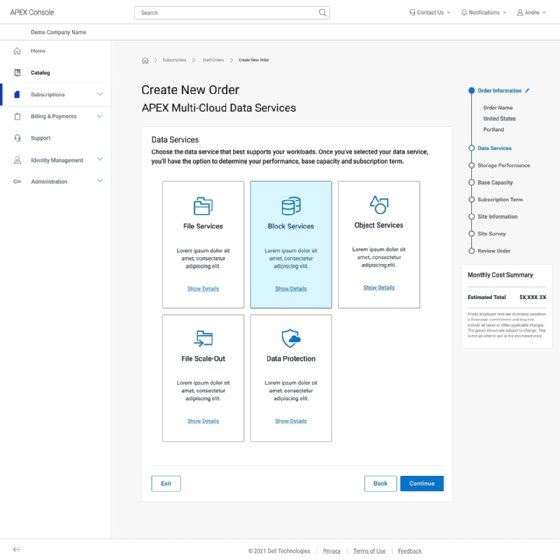Dell Apex introduces new multi-cloud management tools (original) (raw)
Dell is adding more capabilities to its Dell Apex cloud as-as-service portfolio, which are billed as tools to simplify and manage a multi-cloud infrastructure.
Dell Technologies added features, upgrades and expanded availability Wednesday to its cloud-as-a-service offering, Dell Apex, to better meet and anticipate customers' multi-cloud management needs.
The new features include Apex Multi-Cloud Data Services, which give users storage and data protection across clouds and on premises, and Apex Backup Services for SaaS data protection. Dell also expanded availability of existing Apex features, including Apex Data Storage Services for block and file storage and the availability of Apex Cloud Services with VMware Cloud Foundation, an infrastructure as a service (IaaS) offering. Finally, Dell unveiled Project Alpine, which aims to bring the vendor's block and file software to the public cloud.
Dell's expansion of Apex reflects its belief that increasingly complex cloud environments require better tools to ease management. Customers now need to work with more than one hyperscaler cloud provider and juggle multiple software as a service (SaaS) contracts, all while managing on-premises equipment, according to the company.
"Dell has identified important changes taking place in the market," said Mary Johnston Turner, research vice president for future of digital infrastructure at IDC. "It's putting together a portfolio of new capabilities that are targeting those changes to respond to what customers are asking for."
But, she added, it's still early days, and Dell needs to prove to customers that it is a serious infrastructure software player for cloud. Right now, Apex is still evolving, with new features being added or announced in project form, geographic limitations as well as limited partnerships and integrations, Turner said.

Creating new Dell Apex Multi-Cloud Data Services through the console.
Eliminating silos and protecting data
While multi-cloud strategies helped companies take advantage of cloud applications, they also created more -- not fewer -- data silos, which restrict data access for certain users or programs, according to Caitlin Gordon, vice president of product management at Dell Technologies. Apex Multi-Clouds Data Services seeks to eliminate those silos, she said.
"What's unique about this service is that it is actually deployed and offered adjacent to and directly connected to all of the major public clouds," Gordon said.
The service gives users the flexibility to link together data in AWS, Microsoft Azure, Google Cloud Platform (GCP), Oracle Cloud and on premises, Gordon said. If a customer is leveraging a service through Apex, which uses Dell infrastructure under the hood, they can access data from on premises and all of the listed cloud providers as a single set without moving or copying data.
"Apex Multi-Cloud Services is certainly impressive since they provide a single point/console for accessing and managing file, block and object storage and data protection services across all major public clouds," according to Charles King, principal analyst and president of Pund-IT Research.
Another feature, Apex Backup Services for SaaS data protection, addresses a customer demand to provide protection for SaaS-based applications, such as Microsoft 365 and Salesforce, Gordon said. It also provides backup for endpoints and cloud-based applications.
Project Alpine
Still a planned technology and not yet available, Project Alpine focuses on bringing Dell's block and file storage software to the public cloud, Gordon said. Project Alpine abstracts data from PowerStore, Dell's block storage offering, and from PowerScale, its file storage offering, so that it can run on the public cloud. Dell intends to make Alpine available through public cloud marketplaces.
Project Alpine aims to simplify the management of data resources by giving customers a common set of Dell applications to manage their block and file storage, on premises and in the cloud, Pund-IT's King said.
IDC's Turner noted that Project Alpine is looking to bring on-premises block and file storage to hyperscalers. A customer can choose to run a Google Cloud Platform service alongside an AWS service and an on-premises service, and then use Alpine to abstract data from all locations to a common set of data with consistent management and security.
Apex expands its reach
Apex Data Storage Services, Dell's storage as a service (STaaS) offering, is also getting some attention. Dell is expanding its availability to 13 countries across Europe and the Asia-Pacific region. Through a colocation partnership, Dell customers will be able to choose Apex Data Storage Services in Equinix data centers and get a single bill from Dell for storage and data center services, Gordon said.
For its software-defined storage, Dell EMC PowerFlex, and its all-flash array, Dell EMC PowerStore, the vendor added new developer tools, including Amazon EKS Anywhere, which enables users to create and deploy Kubernetes clusters on their infrastructure. On the hyper-converged side, Dell EMC VxRail added SUSE Rancher, an open source container management platform.
Finally, Dell said Apex Cloud Services, a combination of compute, storage and networking resources, is now available on VMware Cloud and noted that its API developer portal was given a refresh.
Next Steps
How Dell is changing the multi-cloud equation
Dell Apex brings cloud Azure HCI to ground
 Microsoft Ignite sparks third-party storage, backup offers
Microsoft Ignite sparks third-party storage, backup offers  By: Tim McCarthy
By: Tim McCarthy  With Project Lightning, Dell to strike out in new directions
With Project Lightning, Dell to strike out in new directions  By: Adam Armstrong
By: Adam Armstrong  Dell revamps storage with PowerStore Prime
Dell revamps storage with PowerStore Prime  Dell expands PowerProtect portfolio, adds GenAI to Apex
Dell expands PowerProtect portfolio, adds GenAI to Apex